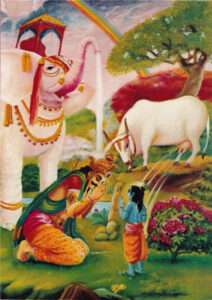Yesterday during Bhagavatam class we were talking about our version of the Maha-bharata under work and how non-devotee scholars translate Vedic books making many serious philosophical and historical mistakes.
This is one I just corrected.
In the Adi Parva, Pausya Parva, Adhyaya 3 verse 148 there is the word jagadesvara referred to Indra, translated as “Supreme Lord”. Jagat = universe, isvara = supreme.
Those who do not read sanskrit in devanagari alphabet have no choice other than to accept this wrong translation and think that Indra is the Supreme Lord. The word Supreme is clear: nobody is above him.
Is Indra the Supreme Lord? He is not so.
The word isvara has several meanings which differ depending on the context. When applied to Indra, who is the King of the Devas and the protector of the worlds, the right translation is “protector”, “controller”, “king” etc.
If we read attentively the Vedas and their corollaries we’ll come to clearly know who is Indra.
The Adi Parva of the Maha-bharata, with many hundreds of footnotes in Vritti format, will be ready in a few months.
This is a section of the book “Brilliant as the Sun”.
To buy the complete book, click above
Post view 383 times




Leave a Reply